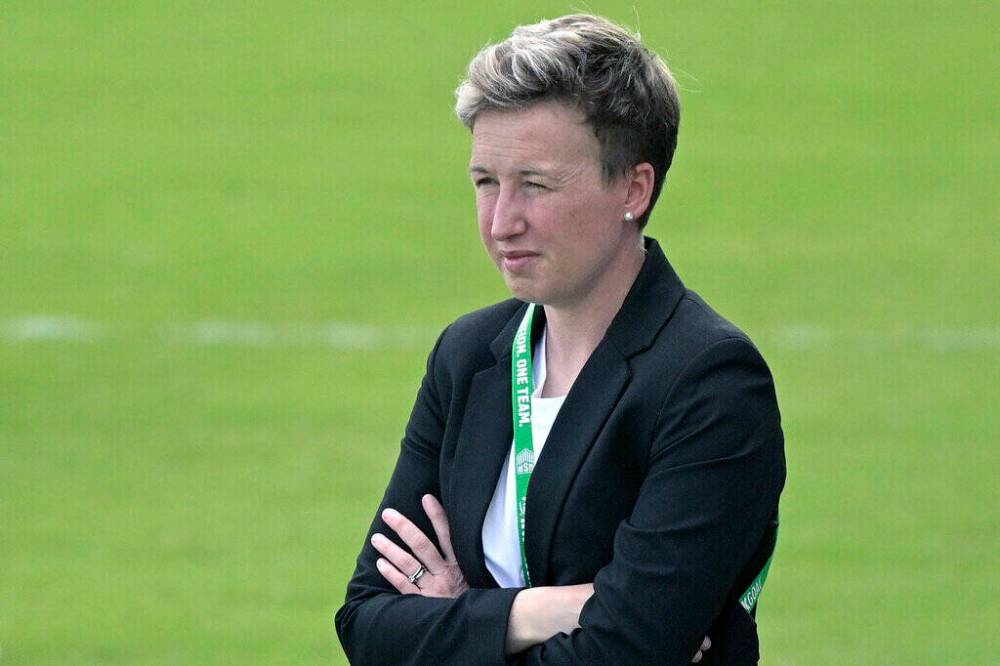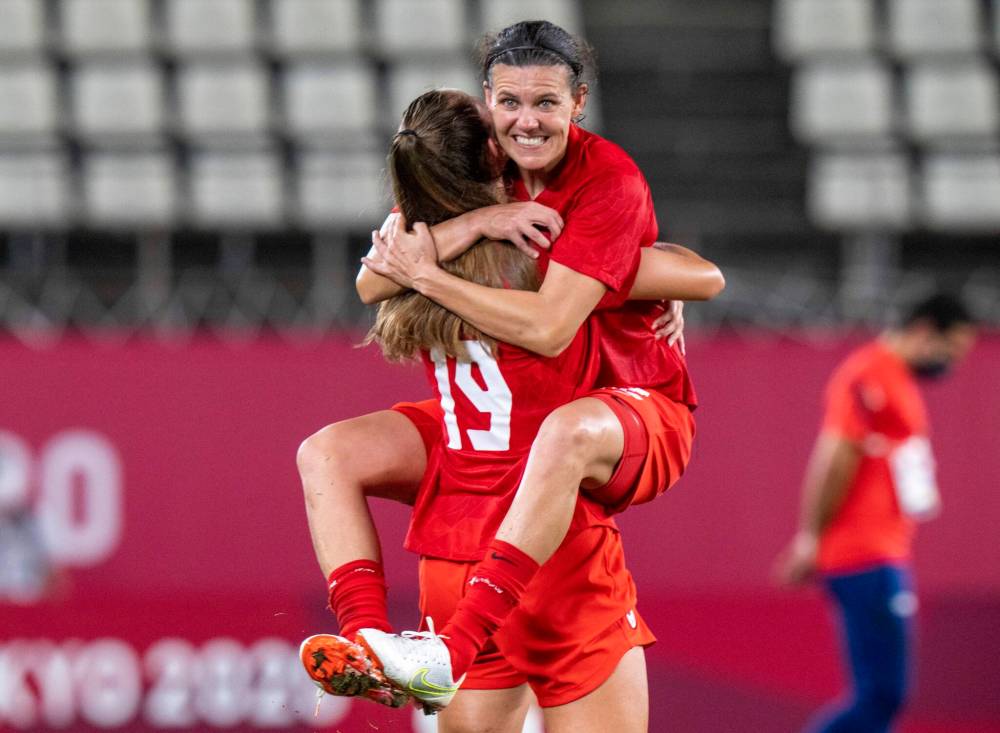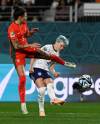Canada will challenge for knockout round
Women’s team enters tournament with some disadvantages, but lack of heart not among them
Advertisement
Read this article for free:
or
Already have an account? Log in here »
To continue reading, please subscribe:
Monthly Digital Subscription
$1 per week for 24 weeks*
- Enjoy unlimited reading on winnipegfreepress.com
- Read the E-Edition, our digital replica newspaper
- Access News Break, our award-winning app
- Play interactive puzzles
*Billed as $4.00 plus GST every four weeks. After 24 weeks, price increases to the regular rate of $19.00 plus GST every four weeks. Offer available to new and qualified returning subscribers only. Cancel any time.
Monthly Digital Subscription
$4.75/week*
- Enjoy unlimited reading on winnipegfreepress.com
- Read the E-Edition, our digital replica newspaper
- Access News Break, our award-winning app
- Play interactive puzzles
*Billed as $19 plus GST every four weeks. Cancel any time.
To continue reading, please subscribe:
Add Free Press access to your Brandon Sun subscription for only an additional
$1 for the first 4 weeks*
*Your next subscription payment will increase by $1.00 and you will be charged $16.99 plus GST for four weeks. After four weeks, your payment will increase to $23.99 plus GST every four weeks.
Read unlimited articles for free today:
or
Already have an account? Log in here »
Hey there, time traveller!
This article was published 14/07/2023 (833 days ago), so information in it may no longer be current.
Canada’s 2023 World Cup will begin against a familiar opponent.
This country’s women’s soccer team faced Group B rivals Nigeria twice last year, winning 2-0 in Vancouver and coming from behind to draw 2-2 in Langford. They’ve also taken on the Super Falcons in a pair of previous tournaments, losing 1-0 in 2011 and drawing 3-3 in 1995 — a result that earned them a first World Cup point.
But Thursday’s showdown in Melbourne (9:30 p.m., TSN) will have less a quality of acquaintance than solidarity, what with the obstacles both sets of players continue to encounter.
That’s if the match even goes ahead.
The Nigerians, 11-time African champions, have threatened to strike in Australia and New Zealand. Some of the squad are owed two years’ back wages; the coach has been paid just half his salary. The federation calls him a “blabbermouth.”
Aggravatingly recognizable
It’s an aggravatingly recognizable scenario to Canada’s internationals, who themselves were only recently reimbursed for work performed in 2022. Captain Christine Sinclair, told she was “bitching” about fair treatment by a former association president, continues to lead a group expending energy in the boardroom it would no doubt prefer to use on the pitch—though occasions for doing so are becoming more and more limited.
Canada Soccer, the dysfunctional governing body, did not arrange home friendlies ahead of the team’s late-June departure. Friday’s closed-door training match at England’s Sunshine Coast base camp was the Olympic Gold Medalists’ first competitive action in more than three months. All told, they’ve played only twice since February.
Ireland, another group stage opponent (July 26, 7 a.m., TSN), have prepared for their opener against co-hosts Australia by playing twice in three weeks. At least Nigeria, last seen April 11, will provide a level field to start. Though that should hardly be the stick with which to measure oneself.
Organization
What Canada lack in support from their program, however, they at least almost make up in manager Bev Priestman’s meticulous organization.
PHELAN M. EBENHACK / ASSOCIATED PRESS FILES Coach Bev Priestman is the brains of the operation.
Knowing there wouldn’t be at least one send-off match akin to the United States’ San Jose friendly with Wales, she arranged for an early arrival Down Under. The extended stay, first in Brisbane and then Melbourne, allowed her players an additional period to acclimatize, adapt to the time change and enjoy some leisure activities they mightn’t have jammed into a tighter schedule.
They went to the beach; they visited an animal sanctuary; they took a boat out on Brisbane River.
If one of the traits of a good manager is the ability to create advantages from nothing, Priestman has it in spades. Canada might not begin the World Cup with the standard of match fitness they’d prefer, but as a group they’ll be unified, relaxed and well-prepared for every game they’ll play.
Additionally, many key contributors should be able to transfer their form from a European club season that ended not too long ago.
Jessie Fleming, for example, started Chelsea’s Champions League semi-final second leg against Barcelona this spring, after which both she and Kadeisha Buchanan featured in the Blues’ FA Cup Final triumph over Manchester United, whose substitutes included Jayde Riviere.
Olympics hero Julia Grosso, meanwhile, played a starting role for Juventus in last month’s final of the Coppa Italia — a win, naturally, because winning is something the 22-year-old just does.
Major contenders
Of course, the World Cup’s major European contenders — namely Spain, England and Germany — will have had the balance of their squads in recent competition, and then there’s the National Women’s Soccer League, still ongoing, and from which most of the United States roster is comprised.
So it’s not an advantage for Canada per se, though the late-season activity should at least tide them over until the Nigeria clash. From there, they’ll look to grow into the tournament against debutantes Ireland, after which they’ll tangle with 10th-ranked Australia (July 31, 5 a.m., TSN) in front of more than 30,000 partisan supporters in Melbourne.
By then they’ll have already played at the city’s Rectangular Stadium, home to the A-League’s Melbourne Victory and Melbourne City, as well as Super Rugby’s Rebels and Rugby League’s Storm. Australia, on the other hand, will have travelled 730 km from their Brisbane base to Sydney for their first match, then back to Brisbane for their second and finally on to Melbourne, 1,800 km away.
Canada should benefit from a lighter travel burden, and a side that perhaps skews more towards youth and prime-career players than first seems apparent — what with the handful of recognizable, veteran leaders — should also work in their favour given the unique physical demands of an unconventional training camp.
Experience and youth
Yes, Sinclair is the team’s experienced, undisputed and legendary skipper — matriarch of modern Canadian soccer — though at 40 her role is rather different than it was a decade and more ago, when she was good for about a goal per game. Fullback Allysha Chapman and midfielder Sophie Schmidt are her only teammates older than 30, one for each third of the park.
FRANK GUNN / THE CANADIAN PRESS FILES Forward Christine Sinclair, the heart, soul and matriarch of Canadian women’s soccer, still excels at age 40. Coach Bev Priestman (below) is the brains of the operation.
They’ll be surrounded by some exceptional footballers, including the aforementioned Fleming, Buchanan and Grosso.
Tottenham Hotspur defender Shelina Zadorsky, recovered from a series of health issues, will provide additional strength to an already sturdy defense if she slots back into her position next to Buchanan. And if she doesn’t, it’ll be because Lyon’s Vanessa Gilles, who scored in a 2-0 win over Brazil in February, will have kept her out of the XI.
It’s no secret that Canada’s predominant strength is in defence, and the cool Australian winter (it’ll be 8 or 9 C at most evening kickoffs) should only help them freeze opposing attacks.
Challenge
The challenge — also no secret — will be in the other goalmouth, where Canada have long been at pains to find the back of the net. They scored just four times in four outings at the last World Cup in France, and it took them five matches to get the same return at home in 2015. Even at the Olympics, which they won, they managed a mere six goals—one for every game they played.
Sinclair, who hasn’t tallied in more than a year, is past her days of leading the line, and the absence of Janine Beckie through injury deprives the team of a threat in the final third, nevermind her natural inclination to inspire by example.
Which is why Grosso and Fleming, and the opportunities they’ll endeavour to create, will have a lot to do with whatever success Canada achieve over the next month.
“Scoring by committee” has rarely been as apt a cliché. Whether through the width Lawrence provides, the energy of Adriana Leon or the much-anticipated ascendancy of Jordyn Huitema, Priestman must work to exploit whatever attacking channels present themselves over the course of a match.
Find enough goals to progress from their bracket and the tournament may suddenly open up for Canada. But they need to win their group. Five points may be sufficient, and the most likely route is to draw with Nigeria (assuming the game is played), win against Ireland and draw with Australia. Though this should be the minimum expectation.
Best-case scenario
Top their section, and the reward will probably be a round of 16 knock-out against the Danes, who are making their first World Cup appearance since 2007. A quarter-final contest with France, Brazil or Colombia would follow. Worry about that then — though hopefully enough Canadian players will have found the necessary momentum to take them even further into August.
This is the best-case scenario. Given the adversity they faced before a ball was kicked, it might also be a remote one. But not impossible.
If there’s anything we’ve learned about the women’s national team down the years it’s that they’ll leave absolutely everything they’ve got on the pitch. They might be shortchanged, but their fans certainly aren’t.
And maybe, just maybe — a bit of Fleming magic here, some vintage Sinclair there, the typically airtight defense — they’ll make a real run. Canada’s record at the Women’s World Cup isn’t the best, so even a spot in the last eight would be something of an achievement.
An unfamiliar position, if you will. And then, wouldn’t it be something if a new contract with Canada Soccer put them into even more unfamiliar territory this summer.
Too much to ask? For now, maybe, unfortunate though it may be. But we can, at the very least, get behind a team that os not just making the best of a difficult situation but trying to turn it into something advantageous, something special, something memorable.
Threads @JerradPeters






